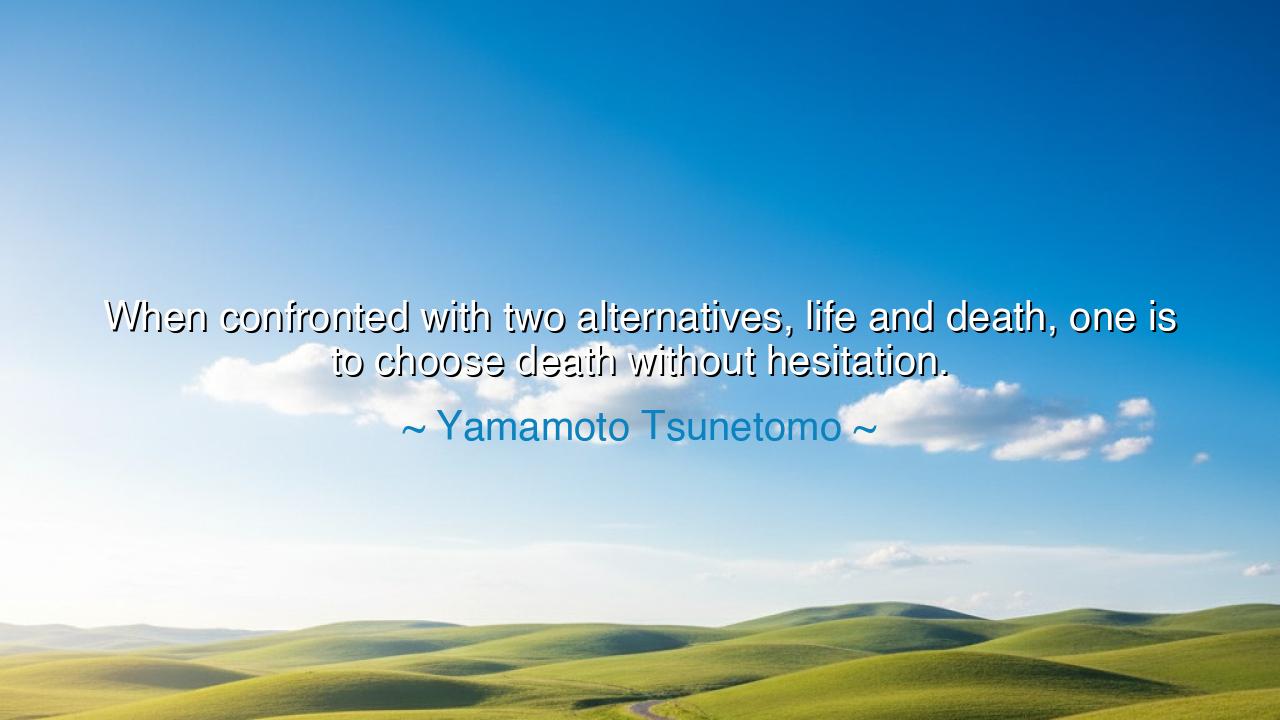
When confronted with two alternatives, life and death, one is to
When confronted with two alternatives, life and death, one is to choose death without hesitation.






In the solemn and uncompromising words of Yamamoto Tsunetomo, the samurai sage of the early eighteenth century, we find one of the most striking declarations of the warrior spirit: “When confronted with two alternatives, life and death, one is to choose death without hesitation.” To the modern ear, this may sound severe, even fatalistic. Yet beneath its harsh surface lies a truth both spiritual and eternal—a call not to seek death, but to transcend the fear of it. For Tsunetomo, this command was not about destruction, but about liberation. The man who has conquered the terror of death has also conquered the chains of hesitation, cowardice, and self-interest. He is truly free to act with honor, purpose, and clarity.
Yamamoto Tsunetomo was a retainer of the Nabeshima clan during Japan’s Edo period, a time when the samurai class was losing its martial function. In an age of peace, the sword had become symbolic rather than practical. But Tsunetomo, steeped in the old code of Bushidō—the Way of the Warrior—feared that comfort and caution would dull the soul of his kind. In his reflections, later compiled into the book known as the Hagakure, he wrote these words as a reminder that the warrior’s first duty was to act decisively, without the paralysis of fear. To “choose death without hesitation” meant that when faced with duty and danger, a true samurai must not cling to life at the expense of integrity. Life without honor, he believed, is no life at all.
To understand his meaning, one must see beyond the literal. Tsunetomo did not glorify death for its own sake. Rather, he saw in death the ultimate measure of commitment. When one lives as though already dead—when one accepts the impermanence of the body and the inevitability of loss—then one becomes capable of acting with complete sincerity. Fear of death breeds hesitation, and hesitation is the root of failure. The samurai who hesitates is already defeated, not by his enemy, but by his own doubt. To live rightly, Tsunetomo taught, is to live each moment as though one has already surrendered life itself. In such surrender, the spirit becomes invincible.
History bears witness to this principle in countless lives of valor. Consider the forty-seven rōnin, who, after their lord was unjustly condemned, chose the path of vengeance though they knew it would lead to their deaths. For years they endured shame and disguise, biding their time in patience and silence. When their hour came, they struck with precision, killed the corrupt official, and then surrendered themselves to the law. They met death with calm acceptance, for their honor was fulfilled. Their story, like Tsunetomo’s teaching, endures as a testament that death embraced for righteousness is not defeat—it is transcendence.
Yet, we must not confine this wisdom to the battlefield. Every soul, whether warrior or scholar, faces moments when fear of loss tempts them to compromise truth. It may be the loss of reputation, comfort, or pride. In those moments, to “choose death” means to sacrifice the lesser self—the ego that clings to safety—in order to preserve what is eternal: integrity, compassion, and purpose. The death Tsunetomo speaks of can also be symbolic: the death of vanity, of hesitation, of attachment. In slaying these inner foes, one gains a freedom greater than life itself.
The ancients of every culture understood this paradox. Socrates, when condemned to die, could have fled into exile, yet he drank the hemlock with serenity, saying that it was better to die for truth than live by deceit. Jesus of Nazareth, too, chose the cross rather than betray his message of love. In their calm before death, we see the same strength Tsunetomo praised—the courage to act rightly without clinging to existence. Such souls are not conquered by death; they conquer death itself through the purity of their resolve.
Thus, my children of the present age, learn this lesson: do not fear death, whether it comes in the flesh or in the spirit. Fear instead the slow dying of the soul that comes from cowardice and compromise. When faced with two paths—one safe but empty, the other perilous yet true—choose the latter, even if it leads to loss. Let your decisions be guided not by survival, but by principle. For the man who lives in constant fear of losing life never truly lives, while the one who gives his life—whether through sacrifice, service, or steadfastness—achieves a life beyond measure.
So, as Yamamoto Tsunetomo taught, make peace with mortality, for in that peace lies freedom. To “choose death without hesitation” is not to seek destruction, but to live so purely that death itself loses its sting. Such is the path of the warrior, the philosopher, the saint—the one who stands firm when others waver, whose courage burns even in the shadow of the grave. Live thus, and though your body may perish, your spirit will echo through eternity, unbroken, unafraid, and eternal.






AAdministratorAdministrator
Welcome, honored guests. Please leave a comment, we will respond soon